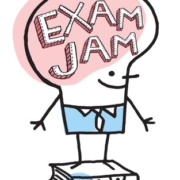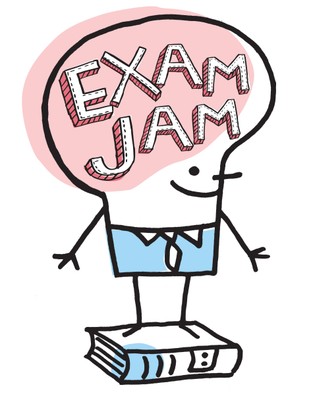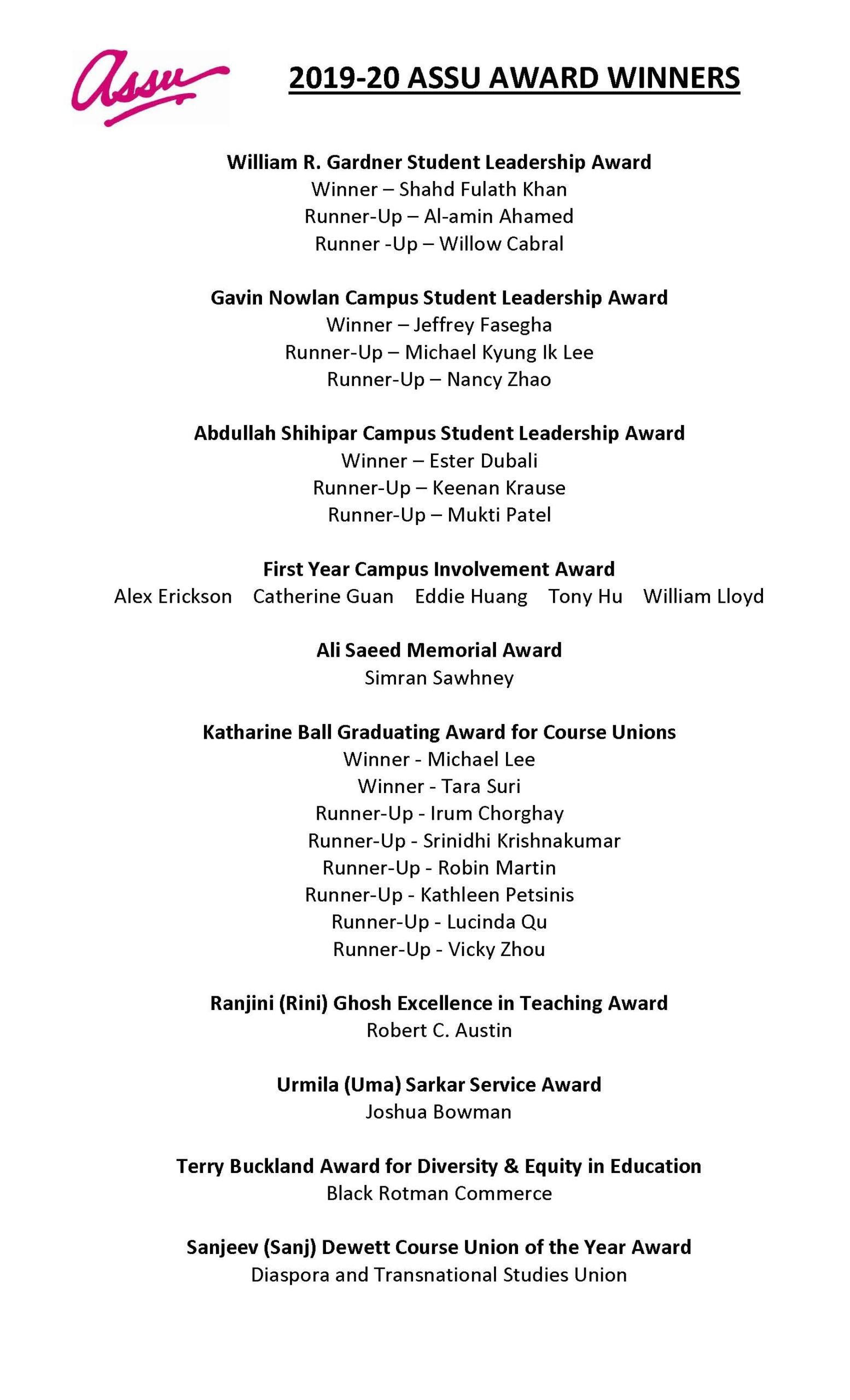Here are the statements from the candidates for our Spring elections:
Candidates for President
Katherine Jung
Hi all!
My name is Katherine and I am running for ASSU President. At the core of my campaign is establishing a COMMUNITY among both the ASSU Council and all Arts & Science students. I want to develop PERSONAL relationships with each of the 60+ course unions and their representatives. I want to learn more about YOU, the students you represent, your programming, events, courses/programs, and what YOU want from the ASSU. By hosting more events and creating more programming, I also want to build the overall Arts & Science COMMUNITY.
I also want the ASSU to create a standardized system and online platform for recording and accessing lectures. Procedures in place are NOT sufficient to cover every life circumstance that prevents students from performing well academically, including illness, public transportation cancellations, dangerous weather, financial circumstance, family emergencies and high amounts of stress. Online lecture recordings can ensure everybody has equal access to the education they pay thousands of dollars for.
Furthermore, I want to increase student engagement by implementing Course Union Fairs where students can learn more about programs/courses and how to GET INVOLVED. I would also want to host networking events and a variety of workshops such as for academic success, finding jobs or getting research experience, and implement a mentorship/tutoring program for first-year students.
As ASSU President, I will listen to ALL of your concerns and suggestions; I will work with YOU to support Arts & Science students, build a welcoming community, and elevate the student experience.
Ikran Jama
As I write this statement, I begin to reflect on my last 3 years on ASSU. I have had the immense pleasure of serving you as ASSU President this year, and ask you to trust me once again to take on this role –to not only continue to contribute to both our ASSU Council and the students we represent, but to ensure growth and stability during this upcoming year.
I have heard your concerns with respect to our academic policies. I have fought for the changes we want to see on our campus, changes like the extension of our CR/NCR deadline to after classes have ended, ending the use of microtransactions, and fighting for the practice of grade manipulations to come to an end. If elected, I hope to continue my work in creating and shaping policies which affect our university experiences.
My experience on ASSU has taught me a lot. It has taught me that admin won’t necessarily be your bff in every conversation, that you will get criticisms, and that at times, an idea you propose may not turn out the way you envisioned it to. ASSU has also taught me how to navigate these issues –you should never back away from what students need at any discussion table, criticisms are valid, and that ideas require lots of commitment. I hope that you will continue to trust me to fight for our interests, and create initiatives which will best serve you.
Remember, we can with Ikran! ?
Candidates for Executive
Lydia Angarso
Hello everyone!
My name is Lydia and I’m in my third year studying Physiology, Global Health, and Immunology. Prayers up for me and my GPA, please.
It’s been one year since I became an ASSU executive, accompanied with 2 years of course union experience, and I hope to get the amazing opportunity to be on ASSU again!
As an ASSU executive, my main project was running the Undergraduate Research Conference (URC). We had over 50 amazing presentations, but I recognize that URC could use a little razzle dazzle. I hope that, with another year, I can work to make URC more engaging for students. Think three-minute theses, alternative presentation styles, and more interdisciplinary collaborations. Research is extremely important to me, and the person I’ve become, so it would be an honour to get the chance to work on URC even more.
If you were at the first ASSU general meeting in September, you may remember me saying that I hate microtransactions, and I still do! It’s hard to navigate this issue, but in my final year of undergrad, I want to continue the work ASSU has done the past few months, to alleviate financial burdens of the students we represent.
My first experience with ASSU was at the September meeting in my first year. Immediately, I felt this sense of community and familiarity that ASSU fosters. Contributing to this community was the best part of my year and I hope you consider voting me to be an ASSU executive again.
Victoria Chen
Hi there!
My name is Victoria and I’m currently in my second term on the ASSU executive, serving as Treasurer. I’ve gained valuable experience in the past two years working with my incredible team on various projects.
In the first year, I took the lead in organizing ASSU’s second annual Undergraduate Research Conference, which showcases Arts & Science students’ scholarly research across the humanities, sciences, and social sciences.
Moreover, I proposed a mentorship program for first-years, international students, and students with accessibility needs—student groups on campus that may have additional challenges adjusting to and navigating life at U of T. I’m thrilled that my idea came to fruition. The ASSU Mentorship Project (AMP) is now CCR-recognized and in its second year, with 90 participants. Moving forward, I hope to continue to expand this program into a network of student mentors and mentees, ultimately enabling greater cohesion within our Arts & Science community.
This year, I also took on ASSU’s American Sign Language (ASL) Course Proposal initiative. I have been working on developing a course proposal with the Dean’s Office, the Linguistics Department, SLUGS, and the UTSU to present at the upcoming Humanities Curriculum Committee meeting. Our goal is to offer UTSG’s first ASL course by Winter 2021.
I’m grateful for my time with ASSU, and I’m eager to continue the work that I’ve already begun. I hope that, through this statement, you can appreciate my commitment to ASSU and to improving the student experience.
Remember: stick with Vic!
Emma Davy
Hi Everyone!
My name is Emma Davy and I’m a third-year student pursuing a specialist in International Relations and a double minor in Economics and Women and Gender Studies. I had the pleasure of serving as an ASSU exec for the first time this year and I am running now because I am confident in my ability to listen and advocate for the student unions and to create change. If re-elected, I want to continue to create podcasts that showcase students’ accomplishments and highlight important issues across the faculty. I also want to create new initiatives that strengthen ASSU’s ties with course unions and to make it easier for students to share their concerns in order to better address the problems facing students across the faculty.
I just started as an exec, but I recognize all the important work that still needs to be done. Specifically, in regard to promoting access to mental health services throughout the university and helping to improve academic support services and policies that build community and foster a sense of community. If I am elected, I do everything to make sure this happens. I have gained so much knowledge in the past year and I feel that skills I have acquired qualify me as effective and dedicated ASSU executive going forward.
Thank you for considering me as your ASSU Executive. Vote for Emma!
Faaris Hussain
Hello everyone, it is a great honour to be announcing my candidacy to be running to be your ASSU Executive. To introduce myself, my name is Faaris Hussain, and I am a third year, going into my fourth year of a Political Science Specialist.
I plan on bringing much insight into the positions that will be informed by my wealth of experience having been an Executive in two large student clubs on campus—in the Muslim Student’s Association, as well as Pakistan Student’s Federation, in which I have served Equity, Administrative, and Finance Roles.
Having engaged with the Vice Provost of Students, and University administration, on issues of student-safety on campus in my time in the MSA, I feel as though the critical role that the ASSU performs on campus in liaising and representing student concerns to the Arts and Science Faculty is something I will have a strength and experience in.
As someone who has been involved with Research in the Faculty of Political Science, I have personally witnessed how immensely rewarding experiences research projects and opportunities are for students, and will make it my personal project to work diligently on the Arts and Science Undergrad Research Conference, in order that other students may also enjoy the rewarding nature of such projects as well.
In sum, my student life exposure has made me acutely aware of the insights of students, and I will seek to represent those insights and concerns to bring a fresh, dynamic, and nuanced perspective into the ASSU.
Martha Taylor
Hi y’all ?
I’m going to keep this brief, because I have assignments I have to write! But for those of you who don’t know me, my name is Martha Taylor and I’m running for re-election with ASSU. I have had the great fortune of being part of this amazing student union for the past 2 years, and I was able to start the #ASSUMovingOnFromCampaign, which I started in order to show students that we are never alone in our struggles. The positive feedback that I have received as a result of this campaign has really shown me that it is positively impacting students. I would love to continue this work, and expand upon it as well and do a “Where are they now” edition for past participants.
Power to the People!
Foti Vito
Hi everyone!
It has been an honour to serve as your ASSU Executive for the past two years, and I could not be more excited to seek re-election for the 2020-2021 year! With your support, I hope to continue bringing my experiences, dedication and enthusiasm to the table to help improve the student experience at the Faculty of Arts & Science.
As an ASSU Executive, my primary initiative has been re-launching the Arbor Journal of Undergraduate Research – a multidisciplinary journal for the arts and sciences. The Arbor Journal gives all students the opportunity to publish their work regardless of particular discipline, and if re-elected, I hope to continue celebrating undergraduate research through initiatives such as Arbor. In particular, I hope to create a database of funding opportunities for international research as well as restructure the ASSU Undergraduate Research Conference to better engage with students.
Having also served on the Arts & Science Council and its various subcommittees, I have aimed to ensure that the policies and programs at our Faculty support student wellbeing and success. With your support, I hope to push forward on more academic policy changes such as allowing CR/NCR on program requirements and ensuring that student consultation is taken on all new course proposals and program modifications. In addition, I hope to increase collaboration with course unions on campaigns regarding grade manipulation and microtransactions, as well as further support course union initiatives, events, and your program-specific campaigns.
Remember, Voti for Foti!

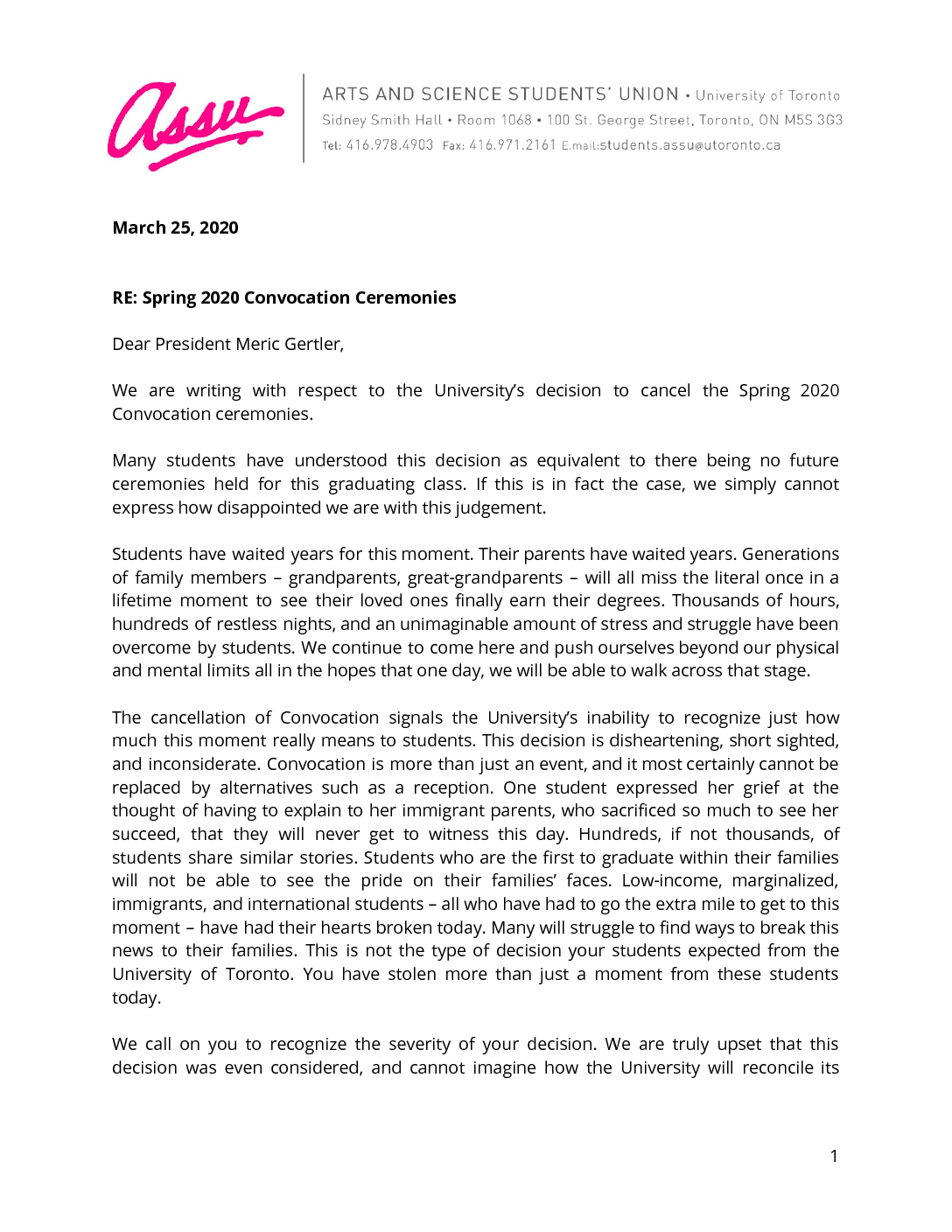
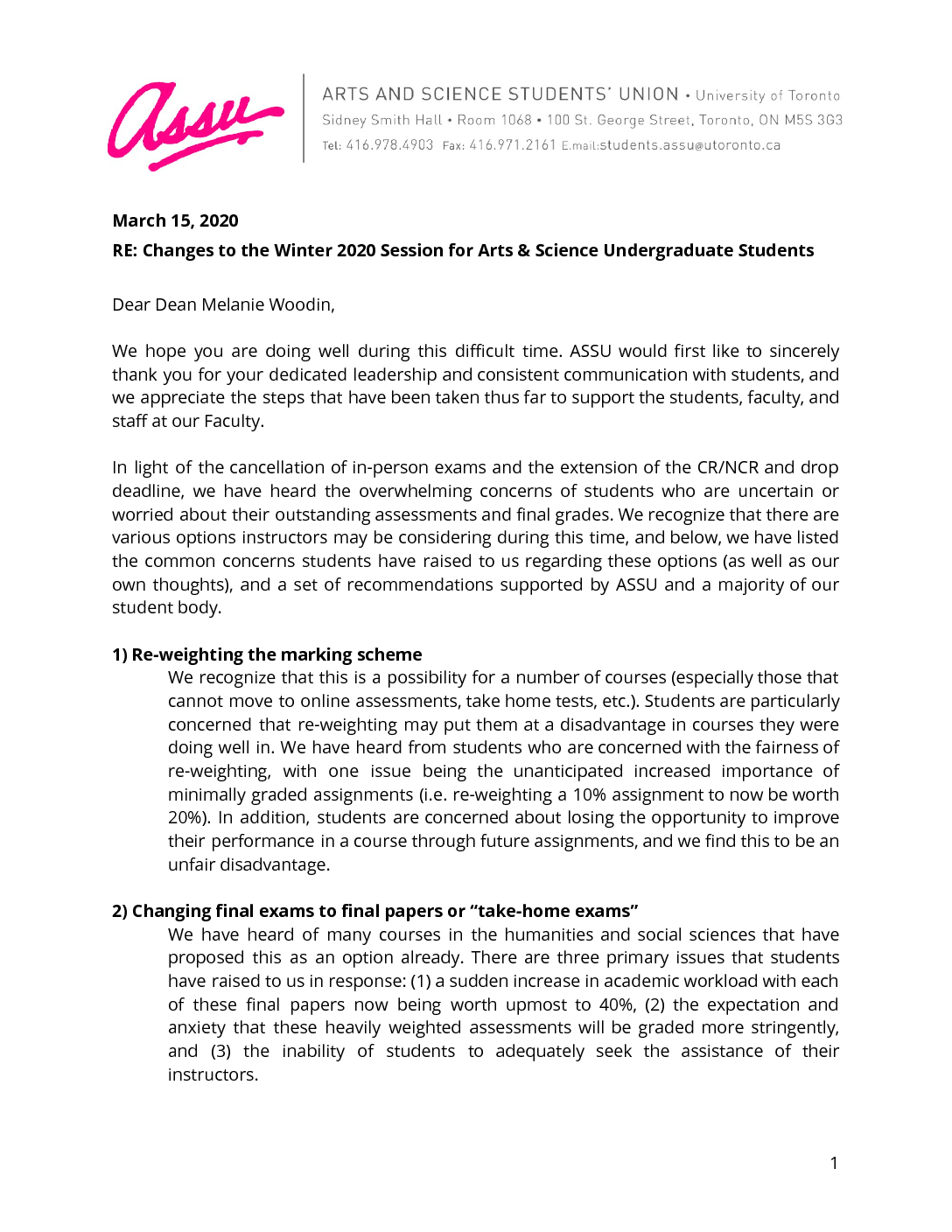

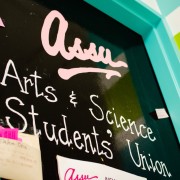 Elena Iourtaeva
Elena Iourtaeva